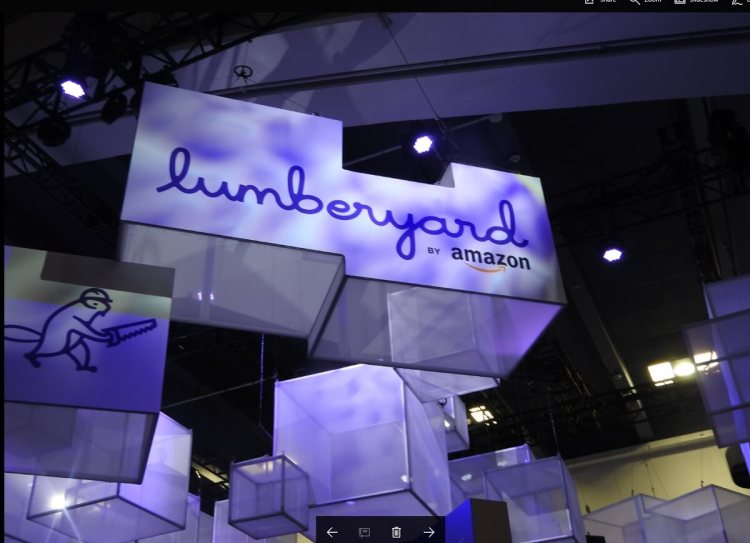John Smedley has had a storied career in games, including the creation of EverQuest, the growth of Sony Online Entertainment, and the spinout of Daybreak Games as an operator of games like the zombie apocalypse online game H1Z1. He even tried a stint as an indie game developer, reliant on Kickstarter funding.
But earlier this year, he joined Amazon Game Studios, starting a new studio in San Diego, California. He is one of many famous game developers to join Amazon, partly because it has so many resources and tremendous advantages. Amazon has acquired the Twitch livestreaming business, created Amazon Web Services to provide cloud infrastructure for connected games, and it has its own Lumberyard game engine.
I talked to Smedley about this, and he said it has given him a lot of creative freedom. His only real marching orders, from Amazon CEO Jeff Bezos himself, is to make games with “ridiculous computation.” We talked about that, and the idea of the “leisure economy,” which may enable all of us to get paid to play games — a major topic at our upcoming GamesBeat 2017 conference on October 5-6 in San Francisco.
Here’s an edited transcript of our conversation.
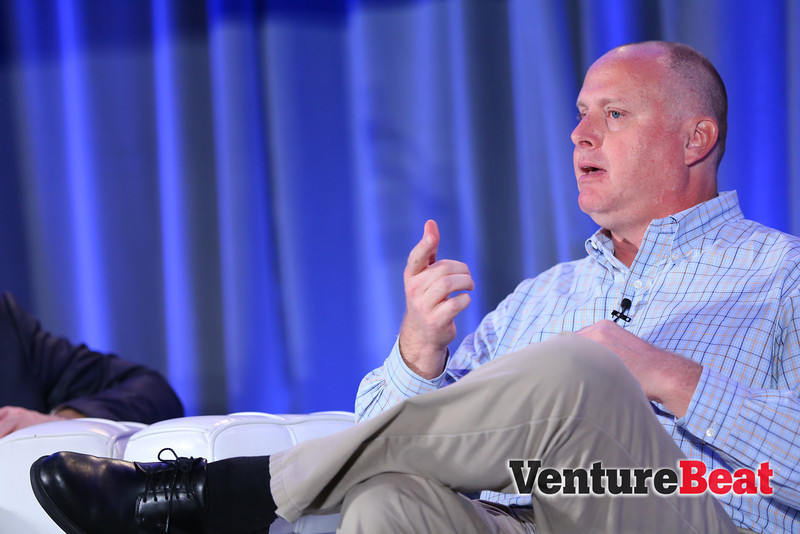
Above: John Smedley, pictured at GamesBeat 2013, is heading a new Amazon game studio in San Diego.
GamesBeat: How long have you been at Amazon now?
John Smedley: I think I just hit seven months. It’s a fun place to work. I’m digging it. We have a growing studio here in San Diego. It’s awesome, because I get to work with some people I’ve worked with a long time — guys like Bill Trost, who’s been making games for a long time. It’s nice to be able to work people I have a long relationship with, and get some new faces in too.
GamesBeat: Are you helping out with any announced titles like Breakaway?
Smedley: Not directly. But one cool thing about the culture here is there’s a big emphasis on playing games all the time, our internal games. I get to give feedback on the playtests we have for Breakaway. That’s being done at the Irvine studio, and we have stuff going on up in Seattle, and then we have our stuff. We’re not quite ready to talk about it yet, but it’s a lot of fun to be able to start new things and go in different directions.
GamesBeat: Amazon’s had this great success getting big names in gaming involved. It’s fairly new at this. What’s the attraction of going to Amazon?
Smedley: If you look at Amazon as a company, it’s the long-term thinking that attracted me the most. They don’t do anything halfway. Being able to be a part of something where the CEO has a clock that’s going to last 10,000 years — it’s a mentality you don’t see anywhere else. Maybe Blizzard would be the closest, where they release games only when they’re ready.
It’s so customer-focused that it’s actually very enabling. You’re worried about making a great game for the customer. The idea of getting it in front of people early and building that community feedback–it’s a very different way of making games. I’m about to turn 49. I’ve been doing this for 30 years. It’s a really different approach, and in my opinion it’s the right way to do this. The fact that Amazon is new to games — they’re taking the leadership principles that run the rest of the company and applying those to games. To me, that’s awesome.
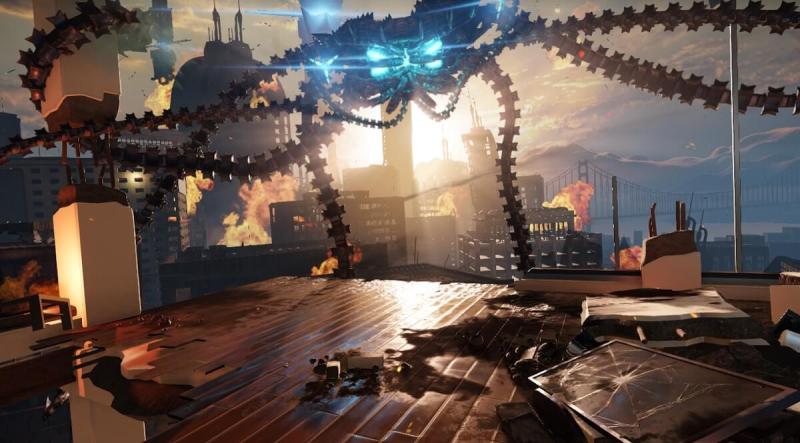
Above: Game art created with Amazon Lumberyard game engine.
GamesBeat: It seems like you have the one-stop shop within Amazon. You have the game engine, other game studios, and Twitch. There’s a lot to help with the process of getting a game done.
Smedley: There is. That’s exactly what attracted me. When Amazon bought Twitch, it wasn’t immediately obvious to the gaming community why they did that. When you see exactly how customer-focused Twitch is, and just how much of a paradigm shift in online communities it is — being a part of that and having them as a sister company is a lot of fun. We get to work with the Twitch guys every day. Seeing where they’re headed is really exciting.
GamesBeat: How far along do you think we are before we get to a stage where people can make a living playing games on Twitch? It seems like quite a few are already there — esports players, influencers.
Smedley: The other weird thing about being in the industry this long is when you see something like Twitch come along, and you see people my kids’ age getting paid — and not just a little money, a lot of money — it just blows my mind. People are already being paid to play games. It’s already changed how games are marketed, radically. It’s change how we as players interact with games.
I don’t know about you, but now I find myself on Twitch watching games I don’t even play. I’m watching the personality. A good example is Lirik. I love watching him play anything. That guy could play checkers and it would be entertaining. That community feeling, where — it used to be, in the old days, we’d get on bulletin boards and stuff like that. Now I go into a chat room with Lirik and all these people — we’re all here to watch this guy play something fun. It’s a blast.
GamesBeat: It feels like the tipping ecosystem is just beginning. “Hey, I’ll give you some money, and if you shout out my name, I’ll be happy.”
Smedley: I watch a lot of Twitch while I’m working. It’s my background noise. Seeing some of the economy springing up — they have the Cheer economy with Bits. Seeing people get tipped, and seeing the amazing rise of Twitch Prime — to me it shows you something. There’s an economy now that didn’t exist a few years ago. That’s what I love about our business. Completely new ideas can take hold and change everything. Look how much it’s changed in just the last three or four years. Who spends money on online ads for gaming now? It’s much more focused on finding streamers and influencers. It’s a more direct conduit to interacting with customers, which is a big deal.
GamesBeat: I wonder how much these economies are linked in some ways. The developer economy is still, “Pay me $60 and here’s your game.” They’re not really participating in this economy that’s grown up around playing their games. It’s all siloed ecosystems. Influencers get their money, developers get their money, and user-generated content people sell their stuff as well. They don’t all seem to be building on each other.
Smedley: Let me give you an example of how that’s changing. You’re probably aware that Twitch is now selling games. Streamers can share in that directly. It links publishers and developers — or just developers, since a lot of these games are indies — with streamers. To me that’s a direction I see gaining momentum. I think you’ll see the same thing down the line, where these economies are becoming intertwined.
When you talk about people being paid to play games, revenue is eventually going to flow multiple ways because of that. When you have a change in paradigms like Twitch represents, watching how the revenue streams follow the customers — to me it’s a whole new business model.
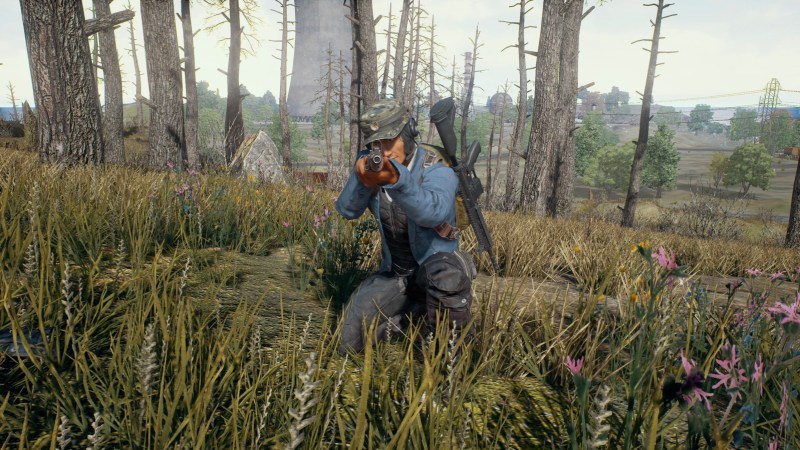
Above: PlayerUnknown’s Battlegrounds in action.
GamesBeat: What do you notice about the games that take off in this environment? PlayerUnknown Battlegrounds is almost dominating a lot of the attention now. There was this group of influencers for things like H1Z1, but a lot of them have moved to the new game. It’s good that new games can grab an audience, but it also shows that influencers can be fickle.
Smedley: It’s an interesting point. I’m a big fan of PUBG myself. I have almost 100 hours in. I know Brendan Greene personally. To me, it’s a good thing to see a space like that open up. That’s where I see — communities move into games that are new, like that battle royale genre. You see multiple games take off. H1Z1 is still hitting highs. Meanwhile PUBG is just crushing.
You’re seeing something else very unique, too, which is the rise of truly multinational games. If you look closely at the numbers for PUBG or H1Z1, you notice that they peak in the mornings because of China. You can follow this all day, and the influencers on Twitch follow it too. With PUBG you’ll see Sacriel, who streams in the morning from Great Britain, and then it’s almost like they do a baton pass, and the North American audience starts to rise. Guys have set times they come in. It’s an amazing phenomenon.
GamesBeat: Does PUBG teach you something as far as the kinds of games you think will take off, or that you want to design?
Smedley: To me, the big lesson from PUBG — and H1Z1 as well — is that the online communities and how we build them — this notion that we’re just a publisher and we hand you down this game from the mountain, that’s gone. Now we have this interactive conversation that goes on between customers and developers. That’s powerful. You now have the rise of more transparent development. You get to know developers as people, because of Twitch and social media.
This very original, unique ecosystem has emerged. Gamers play games and watch streamers. Developers build games and watch streamers and listen to gamers. A lot of the feedback for developers is coming back through Twitch now. This peculiar way to get everybody involved just hasn’t existed before. What PUBG is showing is that if you make a great game and you communicate with your customers, that’s the way to go. That’s why I like Amazon. It’s so customer-focused—that’s why they buy a Twitch. You’re right there with game players. That direct interaction is huge.
GamesBeat: There still seem to be some things that have to be worked out. Toxic behavior has to be dealt with in some way. I’m not sure what’s working there.
Smedley: I would give a shout out to my colleagues at Riot for really paving the way there. One of the cooler things about joining Amazon that I didn’t know is that we have someone who specifically works on toxicity. It’s a shared resources among the games here. You have to care about that now, because a few people can really ruin your game now if you’re not careful. I like the fact that we as an industry are beginning to realize that, and again, I would credit Riot. It’s nice to see that same discipline coming to Amazon. That’s the kind of thing that’s going to be positive in the future.
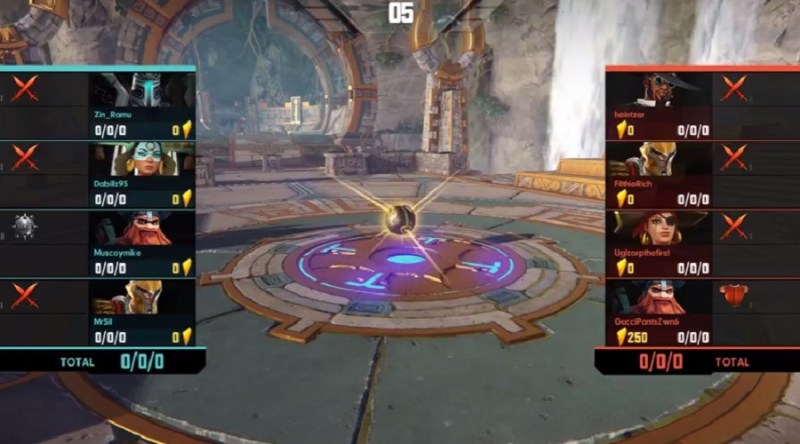
Above: Amazon’s Breakaway is a spectator-friendly action game on the PC.
GamesBeat: Do you think Amazon is better equipped to deal with this problem, relative to your past experience?
Smedley: Certainly we have resources that a lot of companies simply don’t. But what it really comes down to is just hiring the best people and being able to get — because Amazon is so serious about being a big player in games, being able to prioritize headcount for things like toxicity really matters. It’s a way of thinking about games. I don’t think all companies have picked up on this yet. Riot is great about it. Blizzard is up there. It’s nice to be in that kind of environment here at Amazon.
We don’t have to put up with this as gamers. I like that companies are starting to pay attention to it. As I’ve gotten older, my tolerance level for getting on voice chat for someone toxic has just evaporated. We’ll all be better if that stuff is addressed.
